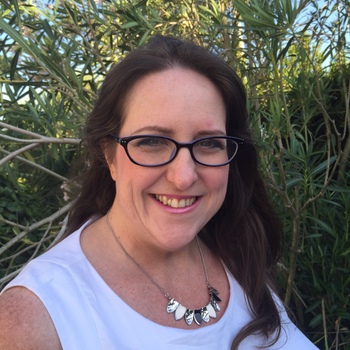Avril da Costa Maia
Did you know that 1 in 4 people in the UK experience a mental health issue each year?
So, we probably all know someone who’s endured this condition.
Yet, it’s a taboo topic.
So, how should we handle illnesses such as depression? And what can we learn from those who’ve struggled with them?
My Page 1 Woman, Avril da Costa Maia, has turned her battle with depression into a business service that helps others to conquer the limiting effect by creating excellence.
With loss and heartbreak a narrative in her life – the death of her mother and her first child, having to leave Zimbabwe, (the family home), her 2nd born placed on a ventilator at birth and not expected to live, her 3rd child born with a disability and serious financial difficulties, you’d have expected her to hit a permanent rock bottom.
But being smart, courageous and selfless, she developed her own brand of staying power to become a successful wife, mother and career woman. How did she do it? ‘I researched what happens to children of depressed mothers. They weren’t as bright, engaged or socialised. I thought, “This isn’t happening to my children!” I put alarms on my phone every day to remind me to hug my children, collect Amanda from school, physically touch her so that I knew I’d not imagined collecting her from school….’ Creative measures for desperate times? Indeed! Here’s Avril’s story.
Describe your work and what you do.
Avril: My business is Argentus Consulting. I’ve done a lot of work mainly in the NHS, about how we learn from what’s gone well and what hasn’t and the strands that we need to concentrate on in order to learn. One of these is personal mastery. I’m running a project called ‘Excited for Excellence’ and currently, I’m concentrating on people who traditionally wouldn’t feel excellent; who, for instance, suffer from low mood, anxiety, depression or lack of confidence. It’s all about how to ask staff to be excellent when we already ask so much of them – the main theme of ‘Excited For Excellence’.
Describe your journey to where you are now?
Avril: I was born in Zimbabwe and we left for South Africa when I was 15 having just watched my mother die from a long illness. And then my father remarried. It was a painful period.
Aged 18, I became a firefighter near Johannesburg. I quickly realised that society wasn’t ready for a woman firefighter. So I went into the ambulance department. It gave me the chance to have an impact. That’s where I met my husband.
I discovered that I wasn’t going to have babies naturally. We had a few cycles of fertility treatment and two miscarriages. Johannesburg was dangerous and I didn’t want to raise my children there. So my husband accepted a job offer in Portugal. Shortly after arriving, we discovered that I was expecting. I carried my daughter for 40 weeks before she passed away. I felt incredibly guilty- like I wasn’t good enough for her. I felt I was being punished for some awful deed I didn’t know I’d committed. It broke me completely.
I saw a counsellor which didn’t help. Then my husband did a 2 weeks stint at work. He told me that when he left I was wearing my dressing gown and when he returned I was in the same position, wearing the same things. He worried that I’d gone mad and sent me to my uncle in Birmingham. I didn’t have the courage to go back to Portugal and persuaded him to join me.
I was still in denial, pretending that my daughter hadn’t died. We had another cycle of fertility treatment. Our beautiful daughter, Amanda, was born poorly and put on a ventilator. She wasn’t expected to survive. She’s 18 now. Four years later Xani was born disabled. I checked myself into a mental hospital with bad post-natal depression.
Throughout it all, I was an NHS medical secretary, followed by NHS project management work such as service improvement and critical care. Now, as a management consultant, I’ve been head of risk at NHS trusts and I’ve worked for places like Toyota and Warner Village Cinemas.
What essential steps did you take to get you where you are today?
Avril: I concentrated on healing myself. I became obese and had 60 kilos to lose, 40 of which I’ve now lost. That’s all about learning to take care of myself and deciding I’m worth it. I had to get over myself in order to see that I was responsible for being better and that I couldn’t just wallow in misery. I had to sustain that and constantly feed myself soul food in order to be kind, loving and forgiving to myself so that I could be the same to others.
What was the most significant thing you did that got you into your current position?
Avril: It was being courageous enough to apply for jobs. Working gave me a sense of value that I didn’t feel inside. Having the guts to say, “I can do that job,” meant that when I went to interview and they saw that I could do the job, it validated me and I started to feel stronger and positive. People often take time off work when they’re depressed. That’s a mistake. The key is to achieve something every day, which you do with your work. Through work, I created an identity that wasn’t broken and did a good job.
I started to understand, if you behave in a particular way, you start to feel a particular way. Behave like a loser and you feel like a loser. Behave like a successful mother, you become a successful mother. Eventually I felt it.
I’m someone who does anything for others but I’m not great at doing things for myself. So I turned everything I did into service for my children, patients and husband, because that’s how I could get through my day. Some people need to do stuff for themselves. I’m not yet far enough on my healing journey to do that. But I will be one day.
What would you say was the greatest challenge you face on your journey?
Avril: Depression is very alluring. It sucks you back. I feel like an alcoholic who’ll never be free of depression and will always be recovering. Some things I’ve been through, I’m amazed it never killed me -in particular, losing my baby. It hurt so much. It’s about daily discipline as I’m not motivated in terms of my career, my appearance, my weight loss. That’s depression for you.
I keep going because I owe it to my children to have a mother they respect. And we had a little miracle princess, 4 years old now, who was completely unexpected. I’m so blessed with my children and my husband too. We’ve been through a lot that should have split us up. But we’re committed to each other and the children – a fine substitute for motivation.
So what was your most revelatory moment?
Avril: Seeing my husband distressed because he thought he’d lost me to mental illness. I thought, “These professionals aren’t helping, the tablets aren’t helping, the therapy I can’t even access. I must sort myself out.” I decided to behave like someone who was mentally well and then built in the emotions around that behaviour.
What key resource was crucial to your success?
Avril: Gratitude. If you’re not grateful for the love you’ve got, and we all have love, you’ll lose it. Being grateful for what you have helps you to see what you do have. When you’re depressed, you can only see what you don’t have. When I saw what I had, I stopped only seeing the great big hole that was my absent baby – and my mum. If you’re not looking at things with the spirit of gratitude, you can’t see them. So you feel unloved because you’re not grateful for the love you’ve got.
What do you understand by leadership?
Avril: I believe that leadership is assumed. If I assume leadership of a room, people just hand it to me. It doesn’t matter where I am, if I decide they’re going to listen to me, they do.
I was speaking to NHS managers recently. They said, “No one listens to us. We’re not high banded enough.”
I said, “I walked in and sat down and you all stopped talking. Why did you do that?”
They said, “Because you’re the leader.”
I said, “Why did you think I was?”
“You walked in and sat down with a face that said we should all shut up now. So we did.”
I said, “I assumed you’d listen to me. It didn’t enter my head that you wouldn’t. If I’d assumed you wouldn’t listen to me and value what I was going to say, you’d have carried on talking. Leadership is assumed. If I can assume it, so can you.”
How has that informed your role as a woman leader?
Avril: It’s the basis of it. I lack confidence sometimes. I think I’m not particularly skilful in something or not experienced. When I’m talking about excellence, there’s always a risk that everyone else in the room is more excellent than I am. I have to be confident that I’ve a unique story and part of that is learning. I’ve learnt a lot in 43 years that sometimes people don’t learn in more years than that. And I have the humility to share that with people without thinking it makes me special. I’m the only one of me around. I’ve something to offer. So if I pin my hat on that, it makes me a leader.
What difference has it made being a woman leader?
Avril: When I was 18 and joining the fire service, if I’d been a man, I’d have continued my career. Because I wasn’t welcome as a woman, I was forced to carve myself an Avril-shaped niche. So in a way, being a woman, we’ve advantages over men. We’ve had to be resourceful, fight for where we are and we’ve gained skills along the way that a lot of men haven’t.
What are your top tips for women who want to be leaders in their field?
Avril: Assume it like a mantel. Create within your mind the possibility that you are a leader and that turns you into one. And it honestly is that simple. And you do the behaviours that the leader you aspire to be would do, and you’re there.
Find out more about Argentus Consulting here.
Did you enjoy this post? Were you inspired? Why not share it with your friends?
And leave a comment. It’s always great to hear from you.
Many thanks.

